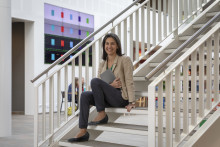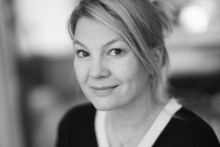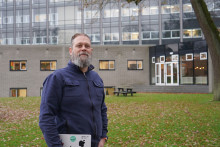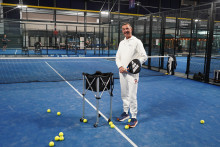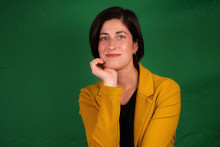Where are you from?
‘I’m originally from Portugal. I have been living abroad for 17 years. First I lived in the UK, then Germany. And I still live in Germany. I initially moved away to pursue a PhD, ended up in Cambridge. My PhD research was about Bioenergetics. Basically, looking at how cells manage their energy. I enjoyed my time in Cambridge tremendously, both professionally and personally. I met my husband there. So it was a productive stay in Cambridge, I can say!’
How did you end up in Enschede?
‘My husband moved to Enschede the same year we met. He is a researcher at ITC faculty. We were sort of commuting for three years, while dating. After I finished my PhD we wanted to be closer. I opted for a post-doc position at the Max Planck institute in Münster, where I did research in the reproductive biology field. We lived in Münster for seven years, got married, had a child in the meantime… Then it was time to move again.’
And you started working at the University of Twente?
‘I realized I didn’t want to be a “real researcher” anymore. To be precise, I wanted to work in science but I didn’t enjoy working in a lab anymore. A collaborator based at the UT drew my attention to the opening of a position as Grants Advisor, and it seemed a nice thing to try. I’ve been here for five years now. Personal life and career have to go side by side. I am happy with the path I chose. Doing a PhD builds up your skills, teaches you how to work out problems by yourself. It doesn’t need to set you on the academic track. And I still work in academia, after all. Science is still in my heart.’
What do you like the most about your job?
‘I work to support researchers to find ways to get funding for their research. What I like the most is to work with people that are motivated but stuck. I can help them unlock the ways of communicating. It’s very rewarding to see I can help them to make progress.’
What is the latest hobby that you picked up?
‘I’m starting to pick up birdwatching. We have recently relocated and can look over an amazing garden with a lot of wildlife, especially birds. It makes us curious to identify what lives in our backyard.’
What are the three things that you would take with you on a deserted island?
‘Well, defying the question… My husband, my son and a computer with Wi-Fi to get in touch with the rest of the family.’
Do you have a big family?
‘No, I have a small family but we are very strongly connected. We are the type to send news every day.’
You have lived in several countries. Which one is your favourite?
‘Germany! I found a cultural comfort zone there. Being away from Portugal is not optimal. I’m far away from my family and I miss the sun, but in the end here I’m protected from professional hardships. I’m living in a nice place and have a great job. I really enjoy the combo of living in Germany and working in the Netherlands. So it’s the region, in the end. I like the international aspect of it. There is a healthy balance of different cultures living together here. Plus, the university is just a special place to work.’
How is this university different from Cambridge?
‘As a student in Cambridge, you live in a bubble. We actually call it the “Cambridge bubble”. But I know working there is less bright. It’s highly competitive and the local infrastructure… Well, let’s face it – it’s very old. The UT was a breath of fresh air for me. I’m very happy here. There is also a softer hierarchical structure, which matches my personality and way of working.’
What is on your bucket list?
‘I don’t really have one. I’m not the passive type, but I’m rather satisfied with what I have, I must say. I’ve achieved a lot. Blessings and challenges continue to come naturally, and I welcome them all.’



